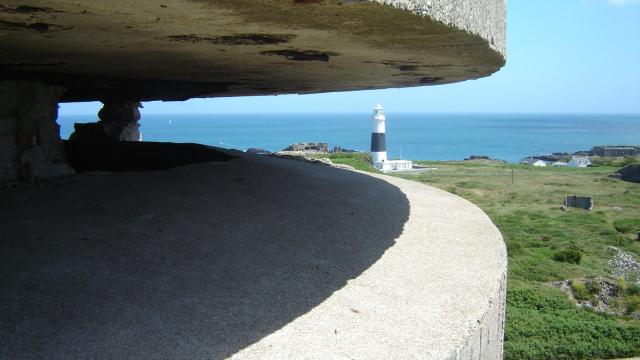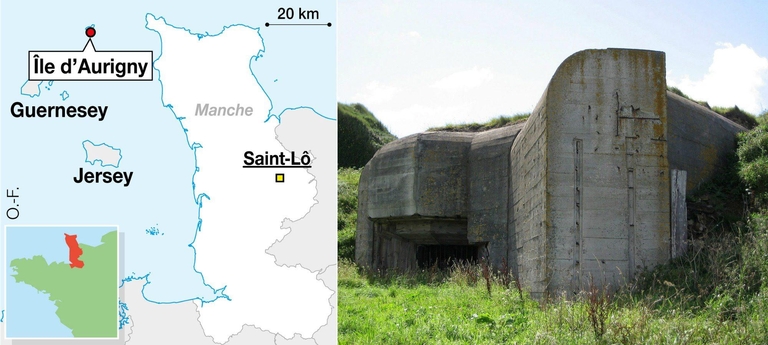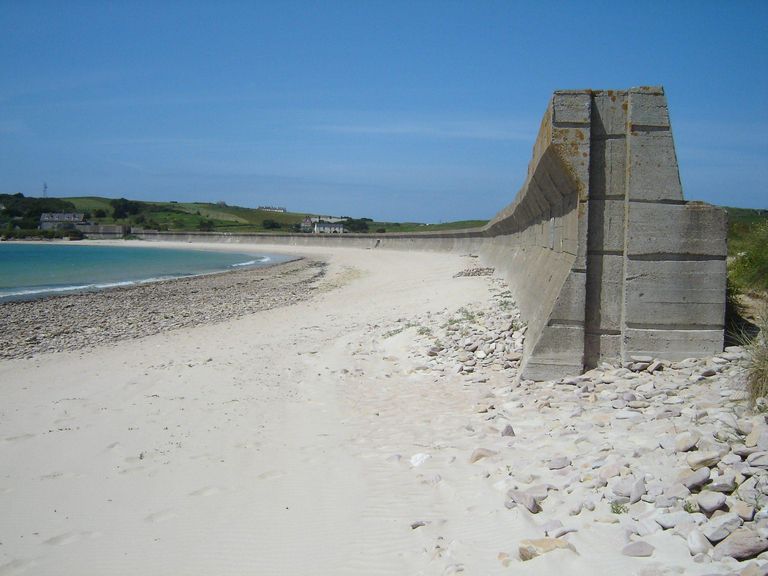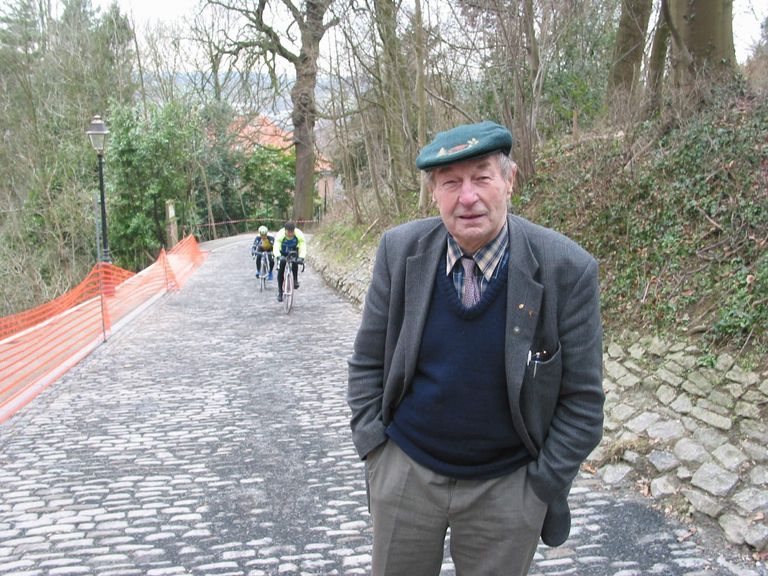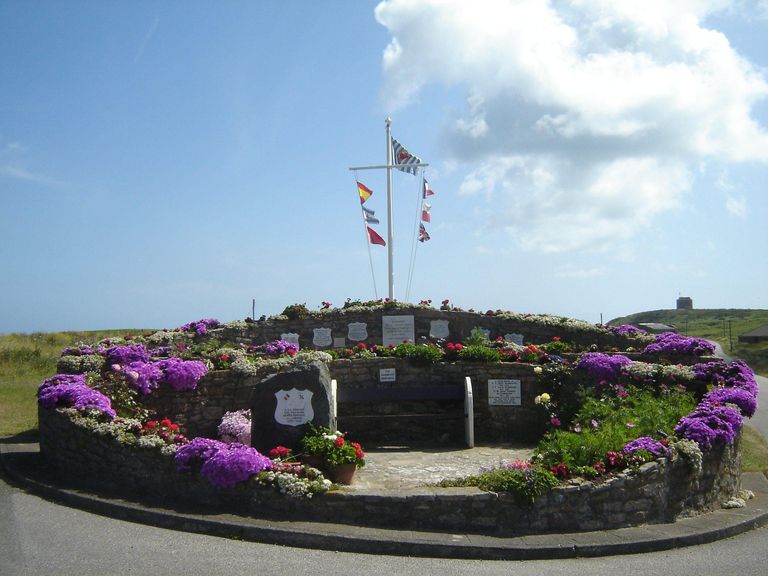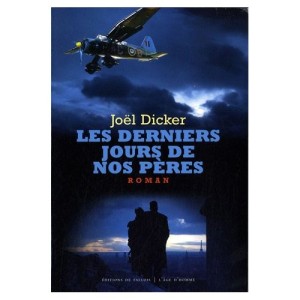- Posts: 3755
- Thank you received: 3612
War literature
- Nikita
-
 Topic Author
Topic Author
- Offline
- "Never interrupt an enemy who's making a mistake." Napoléon Bonaparte
Less
More
11 years 1 week ago - 11 years 1 week ago #43
by Nikita
Replied by Nikita on topic War literature
Well lads, here's the full translation of the post i talked about in my previous post in "What's up at home today", about the concentration camp of Aurigny island.
I did my best to translate it with the help of Google translator and by checking and fixing the automatic translation. I guess it remains faithful to the original, despite some eventual errors.
I post it in the "War literature" forum because this story makes the object of a book by Benoît Luc, so this is it.
The "Adolf" island, the nazi camp at sea.
By François Simon
Alderney is the storm island . For four years, from 1940 to 1944, the Anglo-Norman stone, a few kilometers off the coast of the Cotentin, was a German concentration camp.
Among the islands of the Anglo-Norman archipelago that looks like a fairy tale, she is Cinderella. Alderney is less dowdy, lonely, least favorite, perhaps. She is the most exposed to the blows of dog and tobacco, taken in these appalling currents which are the Raz Blanchard and the Singe.
Alderney spends most of her winters to be shaking her overcoat. The 2400 inhabitants take off at the bad season. The island is in summer, full of amateur of fresh beaches and firsthand wind.
The Germans arrive
It's always better than in 1940. This sad summer, the German army invaded France and get ready for the Battle of Britain. Pending the final victory, the Reich takes the Channel Islands. In Alderney there is no one. A farmer and some old people stayed behind.
On July 2, 1940, German troops decide to make a bridgehead of her. Then, over the months, the Battle of Britain being lost, Alderney is transformed into a fortress. Bunkers and anti-tank walls will concrete the isolated pebble. The "Adolf" island, renamed so on Hitler's order, is no longer a step towards victory but a kind of impasse where the Allies are expected. It's about to make her impregnable.
Up to 5,000 prisoners
But to carry out this project, labor-intensive is needed, free, docile. February 22, 1942, the first deportees arrive on the island: "They will be detained until 5000 in the middle of 1943, divided into four camps," said Luc Benoît, a young historian who worked on this almost cleared memory.
Who is send to Alderney? "Russians, Ukrainians and a few Germans. Spanish Republican refugees in France. We counted 855 French including some rounded up in Marseille, North Africans and especially half-Jews, that means married with a Aryan woman and coming from the Drancy camp (in the Paris suburbs, note by Nikita). They are in fact too Jewish to be released and not enough to be transported to eastern Europe camps".
Prisoners arrive by sea and most of the time by night. Thus on 22 December 1940, the ship Klaus Wilhelm arrives to the port. On board, Norbert Beernaert, a Belgian 20 year old; He was captured in the port of Cherbourg: "One evening, I was given a piece of sausage, a hunk of bread. German Feldwebel told me : " Where you are going, you will need it. "
Cat is good
Where do you arrive, Norbert? "I had no idea. I spent two years there before knowing. In 1940, I thought I was in Germany."
It's cold on this island where one perceives a coast at fingertips (the one of the Cotentin). It's especially hungry. " I put snares. My first rabbit was a cat. It's good, the cat, when you feel hungry ".
On the mysterious island , haggard men come out from boats. Norbert seen barracks rising . And men dying . Especially the Russians who endure the hatred of the Germans, more than the 27 other nationalities on the Adolf island .
He was lucky to find a good job, "One day, a horse broke a leg on port. I cut it with a bayonet They saw that I was a butcher..." He becomes attendant for steaks. He eats his fill. He also bury the dead. He feels safe, a little bit.
"On Alderney, there were only punished prisoners and soldiers. Civilians, half-Jews who arrived with full suitcases, thought themselves free. Until I put their stripes, painted on their suit. There, it's awful to say, I felt a little higher than the unfortunate. I had meat, bread. The nazi system was that, the illusion you believe that you are superior to your neighbor", told this joyful and exciting Fleming, surviving from one piece of hell surrounded by water, and who disappeared five years ago.
Shame almost without trace
For the memory of Alderney is almost a shipwreck: "The island in itself is unknown. She weighs nothing facing Jersey or Guernsey and the traces of the four camps were erased with time", says Luc Benoit. After the war, the association of former prisoners had the greatest difficulties to make recognize the nature of the four concentration camps on the island which were dismantled from June 25, 1944.
There are no witnesses, no neighbors. For the British, German episode is a shame. There is talk about a "failed memory" on Alderney. In any case "difficult". The traces are few: An impressive anti-tank wall at Longis Bay, variant of an Atlantic wall that did not help anything. A discreet plaque at the campsite where the Norderney camp stood. Huge bunkers frozen forever in their dark years juices. And the modest Hammond Memorial, located at the intersection of two roads, flourished as an English garden.
Remains an island, almost inaccessible from France, yet distant 8 km, battered by the crazy winds and fierce embrace of the Raz Blanchard, shaken like bacon at the bottom of a pan. Alderney, the island with a large memory hole, is a prisoner of the winds and the sea, surrounded by a loneliness that adds to her charm, full of a terrible story that she almost stripped ...
All pictures credit : Ouest France / Andree Stephan
The deported from France to Alderney
Benoît Luc
Eurocibles Editions
ISBN: 2354580018
I did my best to translate it with the help of Google translator and by checking and fixing the automatic translation. I guess it remains faithful to the original, despite some eventual errors.
I post it in the "War literature" forum because this story makes the object of a book by Benoît Luc, so this is it.
The "Adolf" island, the nazi camp at sea.
By François Simon
Alderney is the storm island . For four years, from 1940 to 1944, the Anglo-Norman stone, a few kilometers off the coast of the Cotentin, was a German concentration camp.
Among the islands of the Anglo-Norman archipelago that looks like a fairy tale, she is Cinderella. Alderney is less dowdy, lonely, least favorite, perhaps. She is the most exposed to the blows of dog and tobacco, taken in these appalling currents which are the Raz Blanchard and the Singe.
Alderney spends most of her winters to be shaking her overcoat. The 2400 inhabitants take off at the bad season. The island is in summer, full of amateur of fresh beaches and firsthand wind.
The Germans arrive
It's always better than in 1940. This sad summer, the German army invaded France and get ready for the Battle of Britain. Pending the final victory, the Reich takes the Channel Islands. In Alderney there is no one. A farmer and some old people stayed behind.
On July 2, 1940, German troops decide to make a bridgehead of her. Then, over the months, the Battle of Britain being lost, Alderney is transformed into a fortress. Bunkers and anti-tank walls will concrete the isolated pebble. The "Adolf" island, renamed so on Hitler's order, is no longer a step towards victory but a kind of impasse where the Allies are expected. It's about to make her impregnable.
Up to 5,000 prisoners
But to carry out this project, labor-intensive is needed, free, docile. February 22, 1942, the first deportees arrive on the island: "They will be detained until 5000 in the middle of 1943, divided into four camps," said Luc Benoît, a young historian who worked on this almost cleared memory.
Who is send to Alderney? "Russians, Ukrainians and a few Germans. Spanish Republican refugees in France. We counted 855 French including some rounded up in Marseille, North Africans and especially half-Jews, that means married with a Aryan woman and coming from the Drancy camp (in the Paris suburbs, note by Nikita). They are in fact too Jewish to be released and not enough to be transported to eastern Europe camps".
Prisoners arrive by sea and most of the time by night. Thus on 22 December 1940, the ship Klaus Wilhelm arrives to the port. On board, Norbert Beernaert, a Belgian 20 year old; He was captured in the port of Cherbourg: "One evening, I was given a piece of sausage, a hunk of bread. German Feldwebel told me : " Where you are going, you will need it. "
Cat is good
Where do you arrive, Norbert? "I had no idea. I spent two years there before knowing. In 1940, I thought I was in Germany."
It's cold on this island where one perceives a coast at fingertips (the one of the Cotentin). It's especially hungry. " I put snares. My first rabbit was a cat. It's good, the cat, when you feel hungry ".
On the mysterious island , haggard men come out from boats. Norbert seen barracks rising . And men dying . Especially the Russians who endure the hatred of the Germans, more than the 27 other nationalities on the Adolf island .
He was lucky to find a good job, "One day, a horse broke a leg on port. I cut it with a bayonet They saw that I was a butcher..." He becomes attendant for steaks. He eats his fill. He also bury the dead. He feels safe, a little bit.
"On Alderney, there were only punished prisoners and soldiers. Civilians, half-Jews who arrived with full suitcases, thought themselves free. Until I put their stripes, painted on their suit. There, it's awful to say, I felt a little higher than the unfortunate. I had meat, bread. The nazi system was that, the illusion you believe that you are superior to your neighbor", told this joyful and exciting Fleming, surviving from one piece of hell surrounded by water, and who disappeared five years ago.
Shame almost without trace
For the memory of Alderney is almost a shipwreck: "The island in itself is unknown. She weighs nothing facing Jersey or Guernsey and the traces of the four camps were erased with time", says Luc Benoit. After the war, the association of former prisoners had the greatest difficulties to make recognize the nature of the four concentration camps on the island which were dismantled from June 25, 1944.
There are no witnesses, no neighbors. For the British, German episode is a shame. There is talk about a "failed memory" on Alderney. In any case "difficult". The traces are few: An impressive anti-tank wall at Longis Bay, variant of an Atlantic wall that did not help anything. A discreet plaque at the campsite where the Norderney camp stood. Huge bunkers frozen forever in their dark years juices. And the modest Hammond Memorial, located at the intersection of two roads, flourished as an English garden.
Remains an island, almost inaccessible from France, yet distant 8 km, battered by the crazy winds and fierce embrace of the Raz Blanchard, shaken like bacon at the bottom of a pan. Alderney, the island with a large memory hole, is a prisoner of the winds and the sea, surrounded by a loneliness that adds to her charm, full of a terrible story that she almost stripped ...
All pictures credit : Ouest France / Andree Stephan
The deported from France to Alderney
Benoît Luc
Eurocibles Editions
ISBN: 2354580018
Last edit: 11 years 1 week ago by Nikita.
The following user(s) said Thank You: snowman, Juanma66, NL, jacobston
Please Log in or Create an account to join the conversation.
- Nikita
-
 Topic Author
Topic Author
- Offline
- "Never interrupt an enemy who's making a mistake." Napoléon Bonaparte
Less
More
- Posts: 3755
- Thank you received: 3612
11 years 1 week ago #44
by Nikita
Replied by Nikita on topic War literature
Well, after re-reading it, i guess i have to add some words of explanations about this translation:
1 - "Blows of dog and tobacco" : Literal translation of the French "coup de chien" and "coup de tabac". This is French slang, used to designate, especially for sailors slang, a kind of bad weather, with strong wind and rain, and which comes in a brutal way. Perhaps we could call it "tempest" but, for sailors, a tempest is something pretty much stronger than this.
2 - "Shaking the overcoat" : This is also French slang, literally "secouer le paletot". This is used here to designate what people, animals, nature, houses and goods in the general way, endure during this kind of bad weather, especially because of the wind.
Well, i see nothing else, sorry if it remains some errors but, you know, i'm not a professional translator.
1 - "Blows of dog and tobacco" : Literal translation of the French "coup de chien" and "coup de tabac". This is French slang, used to designate, especially for sailors slang, a kind of bad weather, with strong wind and rain, and which comes in a brutal way. Perhaps we could call it "tempest" but, for sailors, a tempest is something pretty much stronger than this.
2 - "Shaking the overcoat" : This is also French slang, literally "secouer le paletot". This is used here to designate what people, animals, nature, houses and goods in the general way, endure during this kind of bad weather, especially because of the wind.
Well, i see nothing else, sorry if it remains some errors but, you know, i'm not a professional translator.
Please Log in or Create an account to join the conversation.
- NL
-

- Offline
Less
More
- Posts: 2401
- Thank you received: 2267
11 years 1 week ago #45
by NL
Trust is hard to gain but easy to lose.
Replied by NL on topic War literature
1: Raining cats and dogs is an English expression that seems similar.
Trust is hard to gain but easy to lose.
The following user(s) said Thank You: Nikita
Please Log in or Create an account to join the conversation.
- Juanma66
-

- Offline
Less
More
- Posts: 277
- Thank you received: 353
10 years 11 months ago #46
by Juanma66
not fear the enemy that attacks you,
be afraid of the false friend that hugs you
Replied by Juanma66 on topic War literature
Today I begin to read
Translation of the epilogue:
The latest Spanish Of Mauthausen,
Carlos Hernandez De Miguel
"I had to try to count nine thousand stories, one for each of the English and Spanish that passed through the concentration camps nazis.Sentia the need to reflect their desires, travel with them in those fateful death trains, closer to their suffering in the fields, solidarity on which they relied to try to survive, his joy for the release and his frustration at the inability to return to their homeland. for this visit the few survivors who can still speak in the first person. meet you has been one of the greatest privileges that gave me life "
In this book you talk about victims and executioners. The Spaniards last survivors of the Nazi death camps remind us of their suffering and the way they lost thousands of comrades at the hands of sinister members of the SS. His words lead us to a world of unimaginable torture, but also of dignity, solidarity and resistance.
This is the story of these men and women who survived or died between the fences of Mauthausen, Buchenwald, Ravensbrück or Dachau. And is also the journalistic chronicle denouncing political, military, business and nations that enabled more than nine thousand Spaniards were deported to death camps.
Translation of the epilogue:
The latest Spanish Of Mauthausen,
Carlos Hernandez De Miguel
"I had to try to count nine thousand stories, one for each of the English and Spanish that passed through the concentration camps nazis.Sentia the need to reflect their desires, travel with them in those fateful death trains, closer to their suffering in the fields, solidarity on which they relied to try to survive, his joy for the release and his frustration at the inability to return to their homeland. for this visit the few survivors who can still speak in the first person. meet you has been one of the greatest privileges that gave me life "
In this book you talk about victims and executioners. The Spaniards last survivors of the Nazi death camps remind us of their suffering and the way they lost thousands of comrades at the hands of sinister members of the SS. His words lead us to a world of unimaginable torture, but also of dignity, solidarity and resistance.
This is the story of these men and women who survived or died between the fences of Mauthausen, Buchenwald, Ravensbrück or Dachau. And is also the journalistic chronicle denouncing political, military, business and nations that enabled more than nine thousand Spaniards were deported to death camps.
not fear the enemy that attacks you,
be afraid of the false friend that hugs you
The following user(s) said Thank You: snowman, Nikita, Maki
Please Log in or Create an account to join the conversation.
- Nikita
-
 Topic Author
Topic Author
- Offline
- "Never interrupt an enemy who's making a mistake." Napoléon Bonaparte
Less
More
- Posts: 3755
- Thank you received: 3612
10 years 11 months ago #47
by Nikita
Replied by Nikita on topic War literature
Thanks for that Juanma, i think i'll purchase it in original Spanish version, for my mother, and, if i can found it in French version for myself.
The following user(s) said Thank You: Juanma66
Please Log in or Create an account to join the conversation.
- Nikita
-
 Topic Author
Topic Author
- Offline
- "Never interrupt an enemy who's making a mistake." Napoléon Bonaparte
Less
More
- Posts: 3755
- Thank you received: 3612
10 years 10 months ago - 10 years 10 months ago #48
by Nikita
Replied by Nikita on topic War literature
A novel about the men an women of the S.O.E.,
Special Operations Executive
, created and monitored by Winston Churchill himself in 1940 to perform secret operations in occupied territories.
A novel, so not an history book, but a well written book, seriously documented and very pleasant to read.
Les derniers jours de nos pères (The last days of our fathers)
Joël Dicker
Editions de Fallois
ISBN : 2877067815
A novel, so not an history book, but a well written book, seriously documented and very pleasant to read.
Les derniers jours de nos pères (The last days of our fathers)
Joël Dicker
Editions de Fallois
ISBN : 2877067815
Last edit: 10 years 10 months ago by Nikita. Reason: Add link
The following user(s) said Thank You: Juanma66, jacobston
Please Log in or Create an account to join the conversation.
Birthdays
- JonnySniper in 2 days
- Tomoyo00 in 3 days


